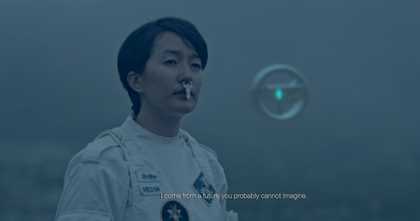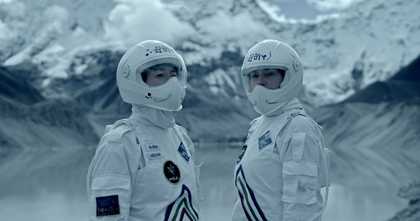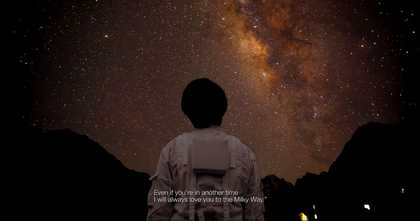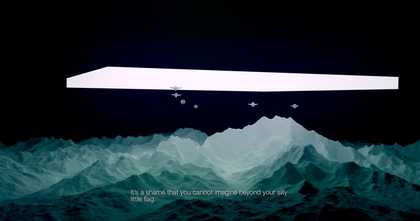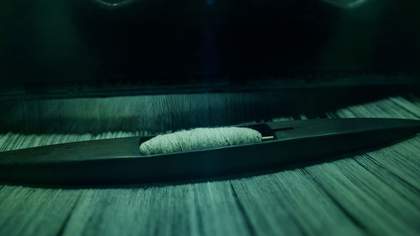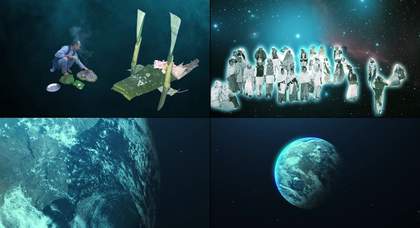Set in an Indigenous Yakthung nation in Nepal, Ningwasum follows two time-travellers, Miksam and Mingsoma, who return to the present from a future where interplanetary civilisations are thriving and living sustainably by adopting Indigenous knowledge and technology. The fragility of our current ecosystem is portrayed in aerial shots and documentary footage of Himalayan glaciers, imbued with an ethereal blue filter. These are woven with digital cosmic landscapes and an immersive soundtrack, which includes electronic sound, spoken word, and folksongs.
Inspired by ancient oral traditions, the film is narrated entirely in the Indigenous Yakthungpan, which the artist imagines as a vital language for the future. Ningwasum – which loosely translates as ‘memory’ in Yakthungpan – explores notions of time, memory and space, and how these shape reality. Limbu has theorised his approach to science fiction as ‘Adivasi Futurism’: a space where Nepalese Indigenous people and artists can imagine themselves in a future of their own making, driven by their culture and traditions.
Mangdem’ma: an invocation for the healing of Adivasi spirits and lands explores the historical fragmentation of the Adivasi Indigenous community in Nepal under postcolonial national identities. The film overlays cartographic and archival material, as well as found and documentary footage, with the voices of Indigenous activists to map the shifting patterns of movement of the Adivasi community, their relationship to ancestral lands and how kinship structures have been altered.
Programme:
- Introduction by the artist
- Mekh Limbu Subba, Mangdem’ma: an invocation for the healing of Adivasi spirits and lands 2022, video, colour, sound, 10 min, Yakthung and Nepali with English subtitles
- Subash Thebe Limbu, Ningwasum 2021, 4K video, colour, sound, 44 min, Yakthung with English subtitles
- Conversation with Subash Thebe Limbu
Subash Thebe Limbu (1981) is a Yakthung artist based in Kathmandu, Nepal and London. Working with sound, film, music, performance, painting and podcast, he draws on science and speculative fiction to address Indigenous struggles resulting from the effects of colonization and climate change.
Limbu graduated from Central Saint Martins at the University of the Arts London and holds degrees from Middlesex University and Lalit Kala Campus in Kathmandu.
All Tate Modern entrances are step-free. You can enter via the Turbine Hall and into the Natalie Bell Building on Holland Street, or into the Blavatnik Building on Sumner street.
The Starr Cinema is on Level 1 of the Natalie Bell Building. There are lifts to every floor of the Blavatnik and Nathalie Bell buildings. Alternatively you can take the stairs.
There is space for wheelchairs and a hearing loop is available.
All works screened in the Starr Cinema have English captions.
- Fully accessible toilets are located on every floor on the concourses.
- A quiet room is available to use in the Natalie Bell Building on Level 4.
- Ear defenders can be borrowed from the Ticket desks.
To help plan your visit to Tate Modern, have a look at our visual story. It includes photographs and information about what you can expect from a visit to the gallery
For more information before your visit:
- Email hello@tate.org.uk
- Call +44 (0)20 7887 8888 – option 1 (daily 09.45–18.00)

